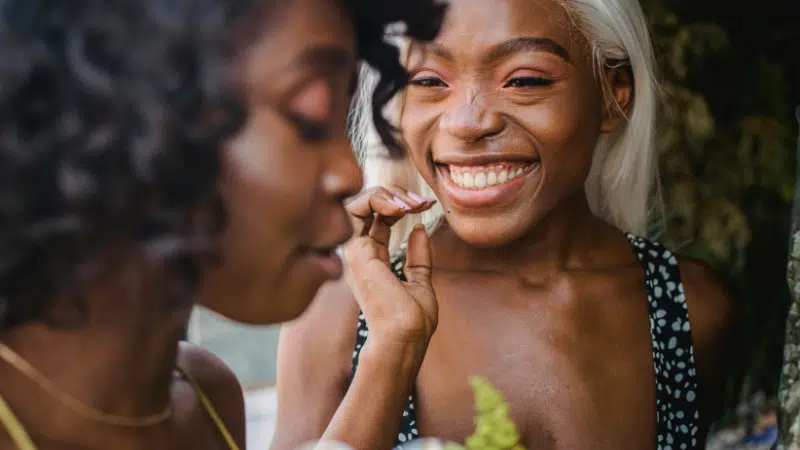From unpredictable schedules and performance pressure to the nonstop hustle of internet culture and everything in between, it’s easy to find yourself overwhelmed as an artist. But taking care of your mental health is one of those things where small, consistent, healthy habits can make a massive difference over time. If you’re feeling the pressure lately, we’re here to help! These are some of our favorite tips that you can start using right away to stay grounded, focused, and ready to create no matter how much you’ve got on your plate. Here’s the rundown…
Daily Mental Health Habits Every Musician Should Practice
Start with Micro-Habits
Contrary to what some Chad on the internet may promise you, you don’t need to wake up at 5am, dunk your face in some fancy water, and run 10 miles before 10am to get your mind right. If anything, doing too much may just stress you out even more. This is where micro-habits come in. These tiny actions are easy to stick with and continue to make a positive change over time. For musicians specifically, this might look like:
- Starting your day by listening to a song that makes you feel grounded
- Doing a quick stretch after rolling out of bed or before you hit the studio
- Taking five deep breaths before going on stage
- Jotting down one thing you’re proud of after a rehearsal or recording session
These tiny habits might not seem like much in the moment, but they help build consistency, reduce stress, and give your brain small moments to reset. Over time, they can improve your focus, boost your mood, and make it easier to stay creatively motivated without adding pressure to do more.
Build a Morning or Pre-Show Routine
How you prep for the day (or when you’re about to go on stage) truly makes a huge difference. A solid routine can help calm your nerves and set the tone for whatever comes next. Even just a few intentional minutes can make a big difference. For example, here’s what you can do:
- Stretch! Especially if you’ve been traveling or sitting for hours. Loosen up your neck, shoulders, and back when you get a chance. Your body carries stress even when you don’t notice it, and that adds up over time.
- Do a quick breathing exercise like box breathing. (inhale for 4, hold for 4, exhale for 4, hold for 4.) Do this a few times to bring your heart rate down and your mind back to center.
- Set an intention. Say it out loud or just think it. Something simple like “I’m here to connect,” or “I’m proud of what I’ve created.” This helps you get grounded and feel more present.
These quick check-ins can help you walk into the day, or onto the stage, feeling more in control and less overwhelmed.
Do a Quick Mental Check-In
Call it whatever you want… journaling, checking in, brain-dumping, reflecting. There is an undeniable benefit to getting your thoughts out of your head so they’re not cluttering up your creative space. You don’t need a fancy notebook or even a whole hour, for that matter. Just a couple of lines in your Notes app or a voice memo on the go can help you process whatever’s going on and stay focused on what matters. If you’re not sure where to start, try asking yourself:
- What stood out to me today: good or bad?
- How did that last session/show really feel?
- Is there something I want to improve or shift next time?
- What’s one thing I actually did well today?
Doing this regularly can help you notice patterns, spot progress, and clear mental static before it builds up. No pressure to be poetic with it, just be real. Psychological research has shown time and time again that reflective writing can reduce stress hormones, improve cognitive processing, and even help regulate emotions by giving structure to thoughts that may otherwise stay stuck in the background. It really is a low-effort habit with high-impact results, especially for creatives constantly juggling a million ideas.
——
🧠 Feed yo’ brain something extra…
How to Support Artist Mental Health as a Label or Manager
10 Music Organizations Empowering Communities Through Education
Symphonic Artists Performing at Festivals This Summer You Don’t Want To Miss
How to Protect Your Mental Health on Social Media as an Artist
——
The Future is Now… Download Some Mental Health Apps
Now, I know you’ve already got your phone on you 24/7… You might as well make it work for your mental health, too.
Headspace is great if you’re new to meditation or want something quick and easy. It offers short, guided sessions that help with focus, stress, and sleep. Calm is another solid choice, especially if you struggle with anxiety or have a hard time sleeping after late-night sessions. It’s packed with breathing exercises, soothing music, and even bedtime stories read by familiar voices (like Idris Elba, Harry Styles, Matthew McConaughey, Zendaya, and more). If you’re more into tracking how you feel over time, Moodnotes makes it easy to log your emotions and spot negative thought patterns using CBT-based techniques.
You don’t need to use all of these to see results. Just find one that works for you.
Quick Breathing & Grounding Exercises
Nobody is completely zen and stress-free all the time. (Not without some help, anyway.) In reality, feeling jittery before a show or overwhelmed after a long day is totally normal. However, there are some simple tools you can use anytime, anywhere to calm yourself down and bring yourself back to center when you need it.
- One of the easiest ones you can do is the 5-4-3-2-1 grounding technique: name 5 things you can see, 4 you can touch, 3 you can hear, 2 you can smell, and 1 you can taste. This helps pull you out of racing thoughts and back into the moment.
- We mentioned this one earlier for quick breathing, but box breathing really does work wonders: inhale for 4 seconds, hold for 4, exhale for 4, hold for 4. Repeat this a few times, and you’ll be good to go.
The best part is, you can use these anywhere. Whether that’s backstage, in the studio, during a quick break between rehearsals, or wherever you need some calm. I genuinely use both of these techniques, and I can’t count how many times they’ve saved me. The key is to make them a habit, so when anxiety hits, you have a go-to reset button you can always count on.
When & How to Find a Therapist
If daily mental health practices like these aren’t enough to manage your stress, anxiety, or creative blocks, professional therapy can truly go a long way. ♡ Therapy can help you address performance anxiety, learn to better manage stress, and help you find healthy coping strategies specific to the demands of a musician’s lifestyle.
If you’re ready to dive into finding a therapist, here’s how to start:
- Virtual therapy platforms like BetterHelp and Talkspace offer flexible scheduling and access to licensed therapists, ideal for musicians with irregular or travel-heavy schedules.
- In-person therapy might feel more personal if you want face-to-face support. Look for therapists who understand the unique challenges creatives face, specifically some who specialize in performance anxiety or working with artists.
- Affordable options: Sliding scale clinics or community mental health centers provide income-based pricing. Some organizations even offer pro bono services for artists.
“But how do I know if I’m ready to start therapy?” If any of the following sound familiar to you, it’s a good sign that therapy can help:
- Persistent feelings of overwhelm, anxiety, or depression that interfere with daily functioning or creative work
- Difficulty managing performance-related stress or stage anxiety
- Creative blocks linked to emotional or psychological factors
- A desire for structured support to develop coping and resilience skills
Recognizing that you need some extra help is a strength, not a weakness. Taking care of your mental health is just as important as tuning your instruments or rehearsing your set. And when you invest in your mind, your creativity can thrive without limits.
End Your Day Intentionally
How you wind down is just as important as how you start your day. Building a simple nighttime routine can help your brain shift out of work mode and get the rest it needs to recover from the day. For example, try these things:
📞 Put your phone on Do Not Disturb or airplane mode to limit distractions and avoid blue light exposure before bed to help your body produce melatonin.
🙆♀️ Do gentle stretches focusing on your neck, shoulders, and back to release tension built up from rehearsals, gigs, or long hours in the studio.
💤 Try a quick meditation or guided sleep session with apps like Calm or Headspace to quiet your mind.
💭 Think about what went well, what you’re grateful for, or anything that’s on your mind to clear mental clutter.
🎶 Listen to calming music or ambient sounds to create a peaceful atmosphere as you prepare to sleep.
☕️ Avoid caffeine and heavy meals at least an hour before bed to improve sleep quality.
Research shows that a consistent nighttime routine improves sleep quality by regulating the body’s internal clock and reducing your stress hormone levels. Not only that, but better sleep supports memory, emotional regulation, and overall cognitive function… all key factors for maintaining creativity and focus as a musician.
Don’t Forget the Basics
It may sound simple, but drinking enough water, getting a bit of sunlight, and stepping outside for fresh air can make a noticeable difference in your mood and energy levels. Especially when you haven’t done it in a while, sometimes we get so lost in the grind we forget how nice it feels. Aside from it being good for the mind, staying hydrated helps with focus and stamina, things that are especially important during long rehearsals, recording sessions, or gigs. And even just 10–15 minutes of natural light can boost your vitamin D levels and support better sleep at night.
Sometimes all we need is to reconnect with the basics. Prioritize taking a walk, touching grass, or just being in nature for a few minutes a day to give your brain a break and reset your nervous system. Trust me, your mind and body will thank you.
To wrap things up…
Taking care of your mental health is essential, not optional. If you’re serious about growing your craft and career, building daily habits that keep your mind clear, your focus sharp, and your creativity flowing is the best thing you can do for yourself. When you prioritize mental wellness, everything else gets easier: performing, writing, collaborating, everything.
Just remember… Every artist faces challenges. You are not alone in what you’re feeling. If you or someone you know is struggling with their mental health, these resources for musicians are some of our favorites.
As always, you got this.



